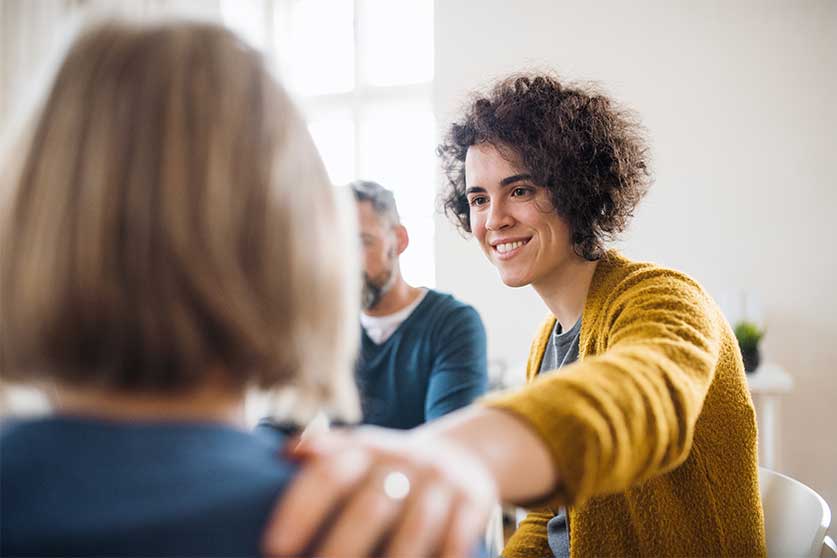The 5 Best Online Sobriety Support Groups In 2024
The online revolution has given us more ways of connecting with people over common interests than ever before, leading to the development of many recovery communities and recovery support groups in virtual spaces. Here are some of the best online sobriety groups you should consider.

Peer support groups are an important part of addiction recovery, especially during low points in your life when relapse becomes increasingly likely.
However, you may not always be willing or able to attend an in-person group meeting due to distance, anxiety, scheduling conflicts, or other reasons. Or, you may decide that you want to participate with a very specific recovery program that caters to your situation or uses a particular approach.
Whatever the reason, virtual meetings are a useful and meaningful tool for those in recovery from substance abuse and addiction. Here are five of the best.
1. Alcoholics Anonymous (AA)
AA meetings and related groups like NA (Narcotics Anonymous), Al-Anon (for family members and loved ones), and Alateen (for teenagers) are renowned and proven resources that have helped countless men and women walk away from drugs and alcohol.
While AA, NA, and other groups meet in-person all around the world, a huge number of online meetings are also available.
AA and these other groups are open to anyone who has ever experienced a problem with alcohol or drugs, regardless of gender, age, or background. They use a 12-step program based on spiritual principles, though members are free to interpret these principles as they see fit.
2. Self-Management & Recovery Training (SMART)
Self-Management and Recovery Training (SMART) is another program with both in-person and online meetings that helps people struggling with substance use disorders.
SMART uses a unique system that focuses on self-empowerment, education, lifestyle changes, and evidence-based mental health techniques including CBT (cognitive behavioral therapy).
Rather than a 12-step system, SMART Recovery facilitators rely on the following four points:
- motivation to change
- coping with urges
- managing thoughts, feelings, and behaviors
- living a balanced lifestyle
SMART Recovery is pitched as the secular alternative to AA/NA, and online options are readily accessible.
3. Women For Sobriety (WFS)
For nearly fifty years, Women for Sobriety (WFS) has operated as a women’s-only peer-support program. And, like other organizations on this list, WFS today operates both in-person and online support groups (forums) with a phone helpline also available.
The program’s basis is secular and lies in psychological and sociological theories that substance abuse and addiction in women stems, at least in part, from negative mental and emotional factors that can and must be reversed during recovery. Factors that may include:
- depression
- poor self-esteem
- societal pressures
- loss of identity
To address these negative factors, WFS uses a program based on 13 acceptance statements that promote spiritual and emotional growth, along with other self-empowering principles like positive reinforcement, cognitive restructuring, and positive self-care (relaxation, diet, and exercise).
4. LifeRing
LifeRing secular recovery groups are another free, donation-supported option that operates both in-person meetings and online recovery meetings, as well as email groups and some social networking.
By connecting with others and developing one’s own self-directed program, Lifering aims to weaken the addict self and awaken and empower the sober self throughout one’s recovery from drug or alcohol addiction.
This puts the focus on recovery squarely on each person in the program, while arming them with important self-help tools, motivation, and affirmations.
5. Loosid
Loosid is an app-based social recovery platform with the motto “Sober Shouldn’t Be Somber!”
It features social networking functionality, community-run 24/7 hotline support groups/helplines, in-person events, a Sobriety Help program for those who are at risk of relapsing or have relapsed, and other resources and recovery tools that even include a sober dating community.
Ultimately, Loosid is less about following a program or attending structured support meetings, and more about finding and connecting with other sober, recovering people who want to come together, have fun, and thrive together without mind-altering substances.
While peer support groups, online forums, message boards, and sober social groups can all have a tremendously positive impact on a person’s recovery journey, they cannot replace the intensive, focused care and support provided in a professional inpatient recovery center.
At Ohio Recovery Center, we offer mental health and addiction treatment in a residential setting. To learn more, please contact us today.
- Alcoholics Anonymous (AA) https://aa-intergroup.org/
- LifeRing Secular Recovery https://lifering.org/online-meetings/
- Loosid https://loosidapp.com/chat-groups/
- SMART Recovery https://smartrecovery.org/meeting
- Women for Sobriety (WFS) https://womenforsobriety.org/meetings/

